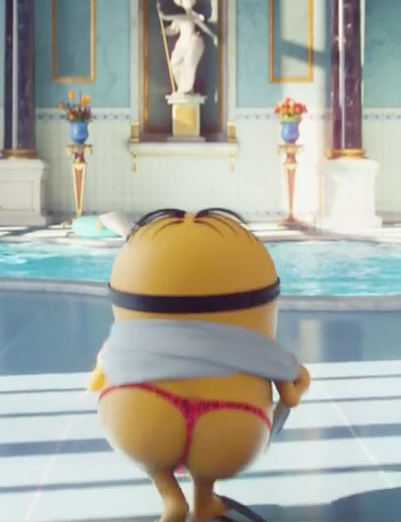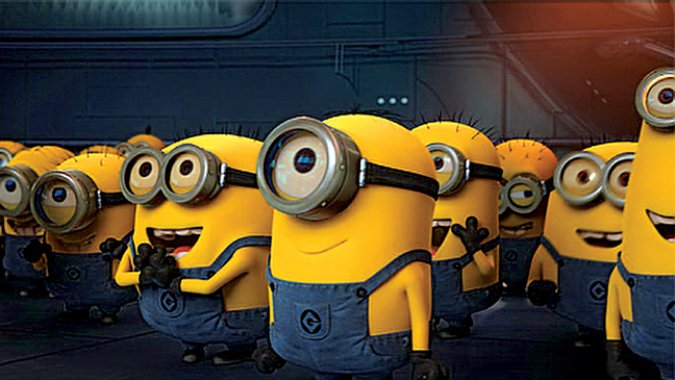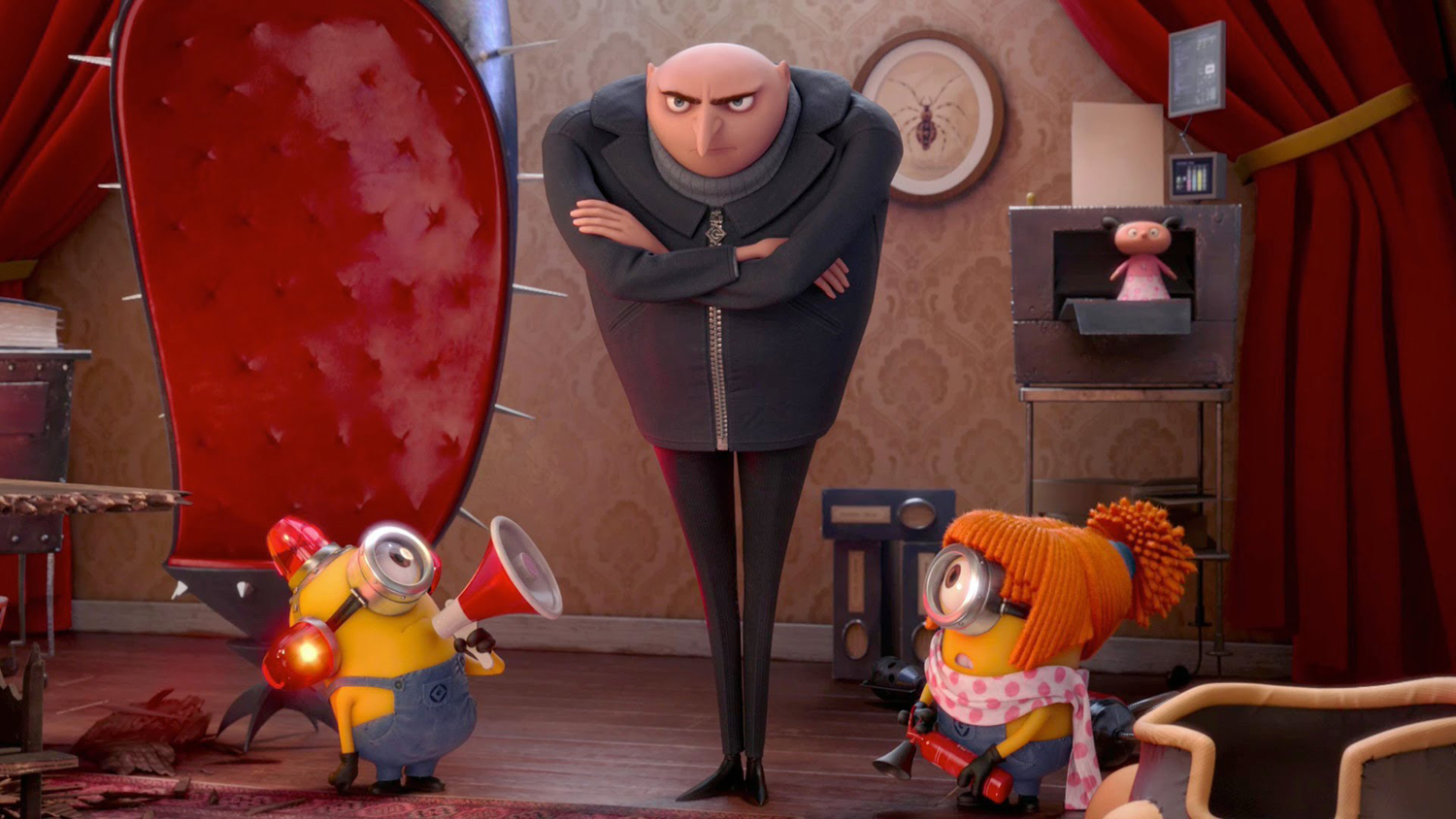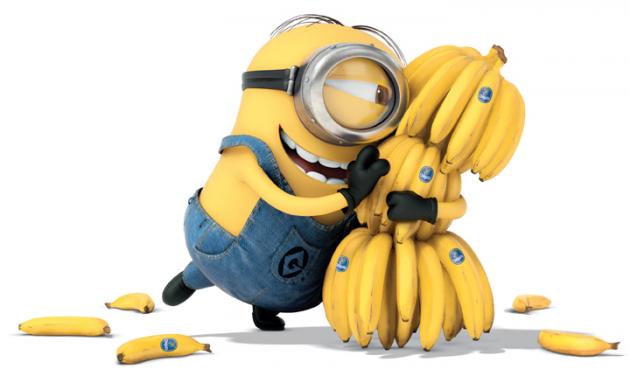 Tim here. This weekend, all of you with small children will be busy going to see Minions, and oh, how all of us without children will laugh at you, and mock you. The minions, of course, being the yellow lozenges with legs and arms from the Despicable Me movies as what speak using some kind of pan-European pidgin, concocted and delivered by co-director Pierre Coffin. I don't know why I'm bothering to explain this. If you know enough pop culture to read a movie site, you encounter the minions, probably multiple times per day. They have turned into an online meme, pitchmen for unrelated products, and if you have a sufficient imagination and enthusiasm for manufactured outrage, they're also teaching five-year-olds the F-word.
Tim here. This weekend, all of you with small children will be busy going to see Minions, and oh, how all of us without children will laugh at you, and mock you. The minions, of course, being the yellow lozenges with legs and arms from the Despicable Me movies as what speak using some kind of pan-European pidgin, concocted and delivered by co-director Pierre Coffin. I don't know why I'm bothering to explain this. If you know enough pop culture to read a movie site, you encounter the minions, probably multiple times per day. They have turned into an online meme, pitchmen for unrelated products, and if you have a sufficient imagination and enthusiasm for manufactured outrage, they're also teaching five-year-olds the F-word.
Frankly, the fact that there's a minions movie seems almost irrelevant, as pointless as making a movie out of Hello Kitty. Which they are doing, because the universe is cruel.
It was not always thus.
It was five years ago this very day that the first Despicable Me opened, which seems much too long ago for such a basically charming but basically insubstantial franchise to have stayed this fresh and alive in pop culture. And at that point, the minions were basically just like Scrat in the Ice Age movies, or the Ewoks: the comic side character for the kiddies in a movie already at least notionally for the kiddies.

They were also good at it: revisiting Despicable Me for the first time since its opening weekend, I was shocked to be reminded how modest it is, including in its broad comedy. As the very first feature project made by Illumination Entertainment, it makes sense that directors Coffin and Chris Renaud (who bailed on the franchise after Despicable Me 2) would work to keep their ambitions in check, and the best parts of the film are purely domestic. That includes the minions, who are used in the first movie much more as seasoning than as the draw, the goofy figures filling out supervillain Gru's house (and gifted with an implicit backstory that is totally incompatible with Minions, but it's surely asking too much for something as gauche as continuity). They represent an infusion of pleasant silliness, a whole mass of simple but basically appealing shapes spouting squeaky noises. They're dog toys, essentially, and I'm so angry that it took me five years to come up with that comparison.
The point being, used as a grace note within the broader contours of a generic animated story, the minions were and remain good comedy – maybe even the best part of Despicable Me, a movie that starts to feel frantic whenever its conflict ramps up, and can too easily lapses into gooey sentiment when it's focused on the surrogate parent drama that makes up its main plot. It makes perfect sense why somebody would walk out of that film declaring that the minions were their favorite part.

But in 2013 came Despicable Me 2, which was so obsessively focused on minions in its marketing that granting them their own titular spin-off is redundant. That film already took every opportunity possible to shove the human characters off to the side in favor of putting in more minions, minions everywhere, minions whose vocabulary and personality were much expanded in the second movie compared to the first. It was tedious then, but the sequel made so much more money than the first, and now we're on the cusp of Minions making another boatload of cash – based on box office tracking, there's at least a possibility of it setting the record for an animated opening weekend, currently held by Shrek the Third.
What can we learn from this? Nothing terribly good. The descent of Despicable Me from a light-touch charmer to a shouty delivery system for easy-to-merchandise slapstick monsters is a case study in a studio giving the audience what they claim to want, and the audience buying it up en masse, and nobody involved at any point in that pipeline actually seems to care in more than a glancing way about quality. The silliness and quaint childish attitude of the first movie have degraded into a marketing onslaught that makes it impossible to even buy a bunch of bananas at the grocery story without being swept up by it.

And for this, Universal and Illumination are going to be rewarded with lots of money and encouraged to keep on doing the same thing. But that's the eternal nature of the film industry: it gets rewarded for its worst habits. Sometimes you get an Inside Out, and everything seems wonderful with family entertainment. And then sometimes a talking yellow dildo comes along to slap you back to reality.